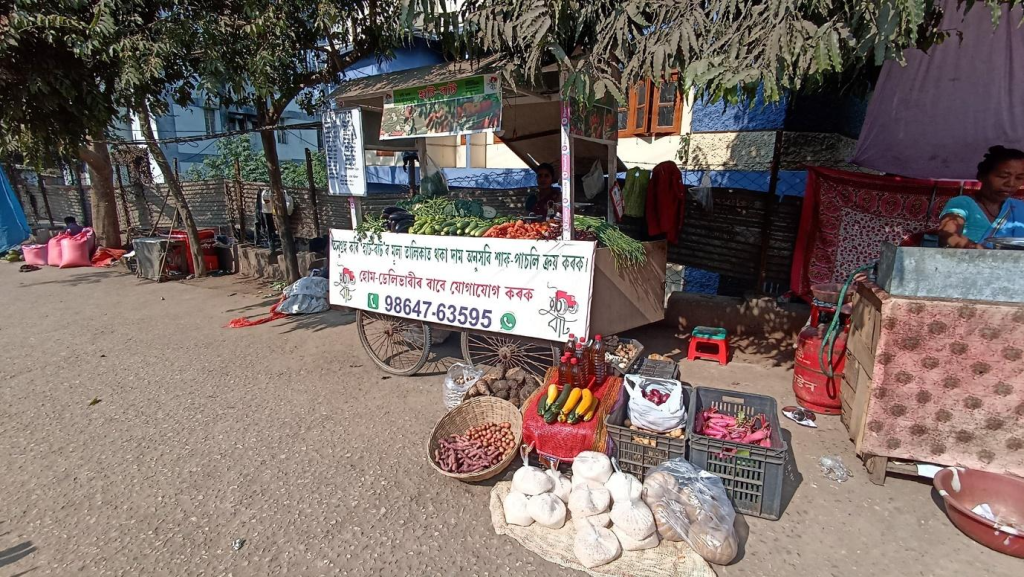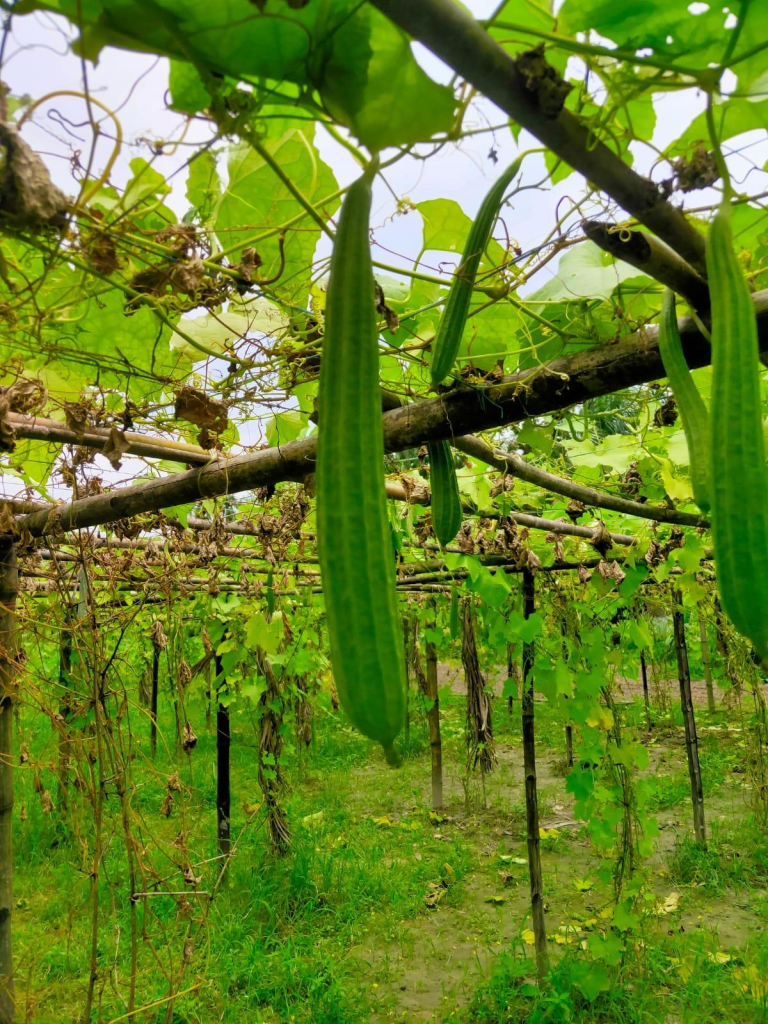As YUVA expanded its work with youth in Guwahati, it faced the daunting task of how to respond to the rising youth unemployment in the city.
The genesis of Haat-Baat
Assam, according to a survey conducted in June 2020, ranked third in terms of unemployment rates. Despite an increase in the literacy rate from 63.25% in 2001 to 72.19% in 2011, the rise in education levels has not translated into a corresponding increase in employment opportunities. The idea to develop alternative livelihoods emerged in the aftermath of the nationwide lockdown, when unemployment was at an all-time high and the youth YUVA works with faced the challenge of being unable to find work despite being educated.
After much brainstorming to address the issue of unemployment, the need in the city and the need to support farmers in the hinterland, the idea for Haat Baat gradually took shape over several months before being successfully implemented. Haat Baat meaning market and road in Assamese, refers to the route to market. Launched in May 2022, this livelihood initiative, led by a group of young individuals, today operates across six different localities in Guwahati. The initiative is facilitated by a collective consisting of six youth with graduate degrees responsible for managing the initiative, two advisors from IIT Guwahati and three additional members from YUVA.
What does Haat-Baat do?
In the beginning, Haat-Baat involved supporting 6 youth with a vegetable vending stall, electric appliances and a weighing machine each, with the understanding and contacts to source produce directly from local farmers, eliminating the need for middlemen. They are also provided with regular mentoring support to improve their business. After six months of their functioning they were also supported with a cold freezer to manage their storage for longer days.
“In order to gain knowledge about various aspects of the initiatives, we were trained by a research scholar from IIT,” said Manjit, a member of Haat-Baat. “The training also taught us how to create a base of loyal customers via conversations with them.” The young individuals involved in Haat-Baat go beyond just selling vegetables; they also educate customers about the various aspects and benefits of the initiative.
Since May 2022, Haat Baat has been running regularly in 6 locations in Guwahati city. The stalls are set up in Chandmari, Silpukhuri, Chandmari Colony, Uzanbazar, Kharghuli and Ulubari localities of Guwahati. These localities were selected after thoroughly surveying various regions. They are marketplaces or residential areas with ample parking spaces that attract customers easily.
Beginning at 7 AM and functioning till 9 PM on all days of the week, the day-to-day work at a Haat Baat stall is intense. After procuring the vegetables early in the morning, the vendors go about selling them in their stalls and cater to home delivery requirements.

The collective actively supports small-scale vendors in linkage with direct farmers, seeking to assist them in expanding their businesses and providing awareness on their rights during evictions.
Encountering roadblocks
However, implementing Haat-Baat was not without its challenges. Some of the obstacles encountered include a financial crunch associated with the required capital investment, wastage of produce due to spoilage and surplus, and establishing direct linkages with farmers.
Earlier, we would source the produce from villages. However, that led to an increase in travel costs. So, we decided to source produce from local mandis itself. We also suffered from a lack of infrastructure and faced intense competition from other street vendors who had already built a strong customer base.
Manjit, a member of Haat-Baat
When Haat-Baat took off, the vendors did not have a designated means of transport. This posed a challenge while transporting the produce. However, with the growth in their income, they invested in a scooter that made it easier to transport produce.
To establish direct connections with farmers, the collective reached out to wholesalers who were already sourcing produce from the farmers.

In the state of Assam, 75% of the population is directly or indirectly dependent on agricultural activities. Although the farming population is an integral part of the state, they also form the most vulnerable section of society. Through direct linkage, Haat-Baat also benefits farmers who often struggle to gain a fair price for their produce.
Haat-Baat members price the vegetables at a lower level than their competitors. Now, they also store excess produce in cold storage in order to prevent spoilage. Additionally, they have incorporated effective waste management techniques as well.
Our goal was to develop an alternative market and regulate the prices of the market. We also plan to expand our business to include organic vegetables. We have been in touch with a few local farms to facilitate the same.
Manjit, a member of Haat-Baat
Establishing an online presence
In addition to selling the vegetables via vendor carts, in July 2022 Haat-Baat also began taking online orders and providing home delivery services. These services are being offered due to the increasing gig economy wherein customers can avail instant delivery while also ensuring a stable consumer base.
“A portion of our sales comes from online services. We still need to work more on it and build a mobile application to enhance user experience,” he added.

The initiative hopes to create a strong online presence via a website and a social media campaign.
Manjit recalled that when the initiative began, the first few months were quite challenging. Soon, the vegetable carts gained traction and translated into profit-making businesses. It helped its members to be self-sufficient.
After our initiative took off successfully, many individuals and the media have appreciated our efforts. I hope Haat-Baat continues to grow and empowers more people via its initiative.
Manjit, a member of Haat-Baat

Haat-Baat: A model of youth-driven change
Haat-Baat is working towards sourcing locally produced grocery items such as mustard oil, turmeric and tea. The team is also looking at getting in touch with farmers from the nearby villages again. This would not only reduce the burden on farmers but also ensures that the vegetables are sold at reasonable rates to consumers.
The vegetables provided by Haat-Baat have always been fresh. Other items such as mustard oil and bora saul provided by Haat-Baat are of very good quality. The products of Haat-Baat are very reasonably priced. Moreover, the fact that they have the option of delivering their products to home makes it convenient to purchase from them.
Souradeep Dey, advocate, Guwahati High Court
I am a regular customer of Haat-Baat, they have been providing quality products at reasonable rates. One suggestion is that it would be great if they can add fruits with the vegetables. It would increase their customer base as people like to shop in one go nowadays. I believe and hope that Haat-Baat will be a unique platform for various amenities in the near future.
Golak Bora, a retired professor
Haat-Baat serves as an inspiring model for community-driven initiatives, emphasizing the importance of grassroots efforts in tackling unemployment and fostering economic growth. By empowering the youth and supporting local producers, Haat-Baat sets a positive example for other regions facing similar challenges. With the dedication, innovation, and unwavering commitment of the 6 youth, Haat-Baat holds the potential to showcase how simple, alternative livelihood options with minimum capital investment can be profitable in the long run.


